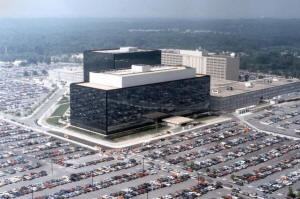|
Russian hackers stole U.S. cyber secrets
from NSA: media reports
 Send a link to a friend
Send a link to a friend
 [October 06, 2017]
By Dustin Volz and Joseph Menn [October 06, 2017]
By Dustin Volz and Joseph Menn
WASHINGTON (Reuters) - Russian
government-backed hackers stole highly classified U.S. cyber secrets in
2015 from the National Security Agency after a contractor put
information on his home computer, two newspapers reported on Thursday.
As reported first by The Wall Street Journal, citing unidentified
sources, the theft included information on penetrating foreign computer
networks and protecting against cyber attacks and is likely to be viewed
as one of the most significant security breaches to date.
In a later story, The Washington Post said the employee had worked at
the NSA's Tailored Access Operations unit for elite hackers before he
was fired in 2015.
The NSA declined to comment, citing agency policy "never to comment on
our affiliates or personnel issues." Reuters was not able to
independently verify the reports.

If confirmed, the hack would mark the latest in a series of breaches of
classified data from the secretive intelligence agency, including the
2013 leaks of data on classified U.S. surveillance programs by
contractor Edward Snowden.
Another contractor, Harold Martin, is awaiting trial on charges that he
took classified NSA material home. The Washington Post reported that
Martin was not involved in the newly disclosed case.
Republican U.S. Senator Ben Sasse, a member of the Senate Armed Services
Committee, said in a statement responding to the Journal report that, if
true, the details were alarming.
"The NSA needs to get its head out of the sand and solve its contractor
problem," Sasse said. "Russia is a clear adversary in cyberspace and we
can't afford these self-inflicted injuries.”
Tensions are already high in Washington over U.S. allegations of a surge
in hacking of American targets by Russians, including the targeting of
state election agencies and the hacking of Democratic Party computers in
a bid to sway the outcome of the 2016 presidential election in favor of
Republican Donald Trump.
Citing unidentified sources, both the Journal and the Post also reported
that the contractor used antivirus software from Moscow-based Kaspersky
Lab, the company whose products were banned from U.S. government
networks last month because of suspicions they help the Kremlin conduct
espionage.
Kaspersky Lab has strongly denied those allegations.
Russian government officials could have used flaws in Kaspersky software
to hack into the machine in question, security experts told Reuters.
They could also have intercepted traffic from the machine to Kaspersky
computers.
[to top of second column] |

An undated aerial handout photo shows the National Security Agency
(NSA) headquarters building in Fort Meade, Maryland. NSA/Handout via
REUTERS

Kaspersky said in a statement on Thursday that it found itself
caught in the middle of a geopolitical fight.
"Kaspersky Lab has not been provided any evidence substantiating the
company's involvement in the alleged incident reported by the Wall
Street Journal," it said. "It is unfortunate that news coverage of
unproven claims continue to perpetuate accusations about the
company."
The Department of Homeland Security on Sept. 13 banned Kaspersky
products in federal networks, and the U.S. Senate approved a bill to
ban them from use by the federal government, citing concerns the
company may be a pawn of the Kremlin and poses a national security
risk.
James Lewis, a cyber expert with the Washington-based Center for
Strategic and International Studies, said the report of the breach
sounded credible, though he did not have firsthand information on
what had transpired.
"The baffling parts are that he was able to get stuff out of the
building and that he was using Kaspersky, despite where he worked,"
Lewis said. He said that intelligence agencies have considered
Kaspersky products to be a source of risk for years.

Democratic Senator Jeanne Shaheen, who led calls in Congress to
purge Kaspersky Lab products from government networks, on Thursday
called on the Trump administration to declassify information about
threats posed by Kaspersky Lab.
"It's a disservice to the public and our national security to
continue withholding this information," Shaheen said in a statement.
(Reporting by Dustin Volz and Joseph Menn; Additional reporing by
Warren Strobel, John Walcott, Doina Chiacu; Editing by Jim Finkle,
Jonathan Oatis and Grant McCool)
[© 2017 Thomson Reuters. All rights
reserved.]
Copyright 2017 Reuters. All rights reserved. This material may not be published,
broadcast, rewritten or redistributed. |